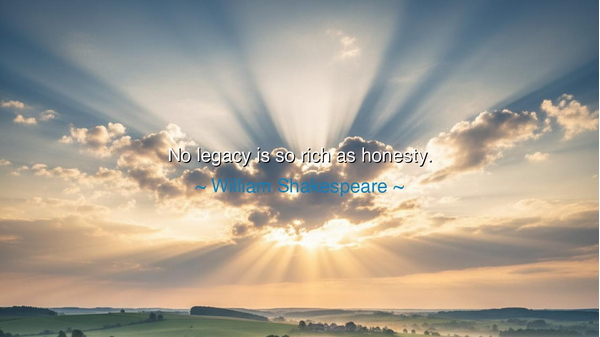
No legacy is so rich as honesty.






William Shakespeare, the poet of the ages, once wrote: “No legacy is so rich as honesty.” In this brief yet thunderous line, he captures a truth that echoes through centuries: all wealth fades, all power crumbles, all fame withers—but honesty endures. It is the treasure that outlives gold, the inheritance that never diminishes, the crown that needs no jewels. Shakespeare, master of human nature, knew that in a world full of deception and vanity, the one gift a person can pass on that will not tarnish is the testimony of a life lived in truth.
The origin of this wisdom can be traced to his play All’s Well That Ends Well, where the line is spoken as counsel, a reminder that reputation built on deceit collapses, while honesty shines brighter with time. The Elizabethan age was a time of ambition and intrigue, when courtiers schemed for power and merchants fought for wealth. Yet Shakespeare, who watched kings and commoners alike rise and fall, saw that none of these pursuits could secure immortality. Only honesty—the alignment of word, deed, and heart—could give a man or woman a legacy that future generations would revere.
History offers many proofs of this truth. Consider George Washington, who as a leader did not enrich himself with crowns or empires, but with integrity. His refusal to cling to power after victory made him not only the first president, but the father of a republic built on trust. His legacy is not in palaces or treasures, but in the honesty of his service. Even centuries later, his name commands respect, for honesty carved his place in the memory of nations.
Contrast this with rulers who built their legacies on lies. Napoleon rose like fire, but his deceptions and ambitions left Europe in ruin, and his empire turned to ashes. The tyrants of the twentieth century, though feared in their day, left behind only a legacy of cruelty, remembered with condemnation. Their riches and their power perished with them. But the humble, honest souls—the Gandhis, the Lincolns, the saints and reformers—live on in the reverence of the human heart.
The truth of Shakespeare’s words is that honesty enriches not only those who leave it, but those who inherit it. A child who remembers their parent’s honesty carries a treasure far greater than gold. A people who inherit a history of honesty can build a future on trust. To pass down honesty is to give the next generation a foundation on which they may stand firm when storms of corruption and deceit arise.
The lesson for us is clear: seek not to leave behind wealth alone, for it can be squandered; nor glory, for it fades; but honesty, for it endures. In your work, in your family, in your friendships, let your word be your bond, and let truth guide your steps. It may not always bring ease or gain in the moment, but in the long journey, it is the richest inheritance you can bestow.
Practical action follows easily: speak truth even when it is costly; live with integrity even when no one is watching; honor your promises even when they weigh upon you. Remember that every deed is a brick in the house of your legacy, and only honesty can build a house that time cannot tear down.
Thus Shakespeare’s wisdom stands eternal: “No legacy is so rich as honesty.” Riches perish, power fails, but honesty endures beyond the grave. Leave to the world not only what you owned, but who you truly were. For in that truth lies the only wealth that time and death cannot steal.






NALee Ngoc Anh
Shakespeare seems to suggest that honesty is not just a virtue but a lasting legacy. How do we build a life of honesty, especially when societal pressures often encourage us to hide our true selves? Does this quote imply that living truthfully is more important than any material or external achievement? How does honesty shape our relationships and how we are remembered, compared to achievements or possessions that often define success?
8HNgan 8/2 Huynh
The idea of honesty as a legacy is compelling, but I wonder how practical it is in today’s society. Can we really be honest in all aspects of our lives without facing consequences? What about the idea of 'white lies' or protecting others from the truth—does that go against the notion of honesty being the richest legacy? How do we reconcile the value of honesty with the complexities of human relationships?
NNNhan Nguyen
Shakespeare’s view of honesty as a rich legacy raises a powerful question—how much do we value honesty in our daily lives? In today’s world, where people often focus on appearances or success, does honesty still hold the same weight? How do we ensure that we live authentically, and what challenges might we face when doing so? Can we truly leave a legacy of honesty without compromising other aspects of our lives?
BNLam Hoang Bao Nam
I appreciate how Shakespeare emphasizes honesty over material success. But is honesty always easy to maintain, especially in difficult situations? What about situations where being honest might hurt others or cause harm? Does honesty always lead to positive outcomes, or can it sometimes backfire? How do we balance honesty with compassion, especially when the truth is hard to hear or might damage relationships?
UGUser Google
This quote makes me reflect on the idea of legacy and what we leave behind. If honesty is the richest legacy, does that mean that everything else—wealth, fame, or achievements—pales in comparison? Can someone who lives a life full of honesty truly be considered successful, even without accumulating material wealth or recognition? How does honesty shape the way others remember us, and how does it influence our own sense of fulfillment?